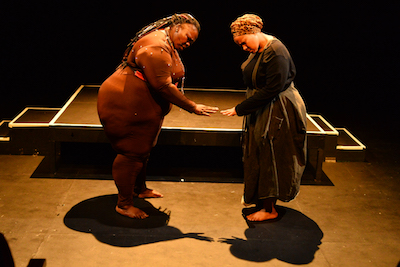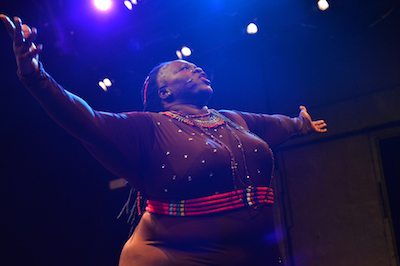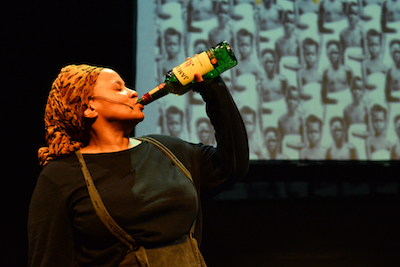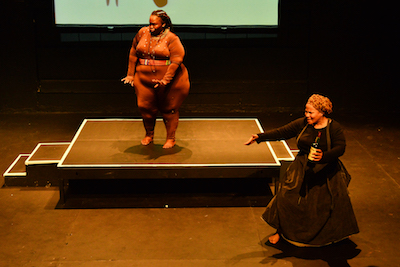 The war over women’s bodies is nothing new, even if GBV (gender-based violence) has only recently moved to the top of our national lexicon.
The war over women’s bodies is nothing new, even if GBV (gender-based violence) has only recently moved to the top of our national lexicon.
Saartjie Baartman was making the headlines way back in the 1800s, when her large Khoikhoi buttocks and exotic skin colour saw her exhibited as a freak show attraction in London and Paris.
Centuries later, African women are still being body shamed and treated as property to be owned, derided and abused. “Are we she?” asks playwright and actress Lebo Mashile in Venus vs Modernity, a long-simmering resentment that’s slowly been honed into a full play.
The result is an exuberant, loud and lively production that builds from a slow, thoughtful start as Mashile, playing Saartjie, connects with Venus, played by opera singer Ann Masina.
 The story treads the historically true path of Saartjie as a young girl being enslaved in the Cape and working for a family with a philandering head of the household. We follow her as she falls for a soldier, loses her baby, and agrees to go to England with a sweet-talking wideboy who promises show her the sights and make her famous.
The story treads the historically true path of Saartjie as a young girl being enslaved in the Cape and working for a family with a philandering head of the household. We follow her as she falls for a soldier, loses her baby, and agrees to go to England with a sweet-talking wideboy who promises show her the sights and make her famous.
Her constant companion is Venus, a tempestuous, passionate and formidable goddess, and the interaction between them allows the piece to expand into a fictionalised world and set some scenes in current times, since these problems are still with us now. Saartjie Baartman ‘is a grand ancestor for every black woman who has ever felt othered, degraded, hyper-visible, yet invisible,’ Mashile writes in the programme notes.
The story unfolds in a fusion of words, vivid physical actions, songs, dancing, a screen showing images and soundbites to bring in other characters along the way.
 Mashile is a feisty livewire with a brilliant talent for mimicry, tomfoolery and heart-wrenching sorrow. Masina, meanwhile, will blow you away with her classical opera voice, filling the small theatre so lustily you can almost see the soundwaves.
Mashile is a feisty livewire with a brilliant talent for mimicry, tomfoolery and heart-wrenching sorrow. Masina, meanwhile, will blow you away with her classical opera voice, filling the small theatre so lustily you can almost see the soundwaves.
Masina is a large lady, so it’s fitting that she’s making her acting debut in Venus vs Modernity, which centres on how the size and shape of women’s bodies are used to define us. She’s beautifully loud and proud in a clinging catsuit, and, like Mashile, has no qualms about making fun of herself. Even though every step she takes attracts judgmental looks or catcalls that make her feel she’s on a stage, in a court room or braving a battle ground.
There are twerking songs about hookers, and lyrical advice to women about not undervaluing themselves – or selling themselves too cheaply, if that’s the route they choose. In some scenes the women are provocatively crude, revelling in the chance to plonk female needs and desires in the limelight. To set their own agendas and proudly own their sexuality. It might make you giggle – sorry for you if it makes you tut - and hopefully grin and think you go, girls!
The mood of the piece varies greatly, and the humorous or raunchy moments give way to scenes of sorrow or torment, as a scientist probes the fat and weighs up the breasts of his exhibit, the Hottentot Venus. Then a photo of young Fezekile Kuzwayo appears, better known as Khwezi, the now deceased woman vilified for accusing Jacob Zuma of rape. Another example of how the female victim becomes the villain in our skewed society where black women are seen as property for the patriarchy.
 The show is by no means perfect. Sometimes the words are lost to the backing music, the recorded voices aren’t always clear, a few scenes lingered too long, or I wasn’t sure of the historical events being referenced. But the seeds it plants and nurtures are essential.
The show is by no means perfect. Sometimes the words are lost to the backing music, the recorded voices aren’t always clear, a few scenes lingered too long, or I wasn’t sure of the historical events being referenced. But the seeds it plants and nurtures are essential.
Afterwards the women hold a question and answer session, only taking questions or comments from black women, since there are so few safe spaces dedicated to their voices.
Mashile developed the production with the help of actress and director Pamela Nomvete for the best part of five years. With Nomvete now finding more rewarding work for her skills in England than she can in South Africa, poet and playwright Koleka Putuma has taken over as the director.
After its run at the Market Theatre, the production travels to Amsterdam for Afro-Vibes in October. Since it was the Dutch that enslaved Saartjie when they took over the Cape, there should be some soul searching moments for those audiences too.
Venus vs Modernity runs at the Market Theatre until 28 September. Tickets from Webtickets. Photos: Lungelo Mbulwana